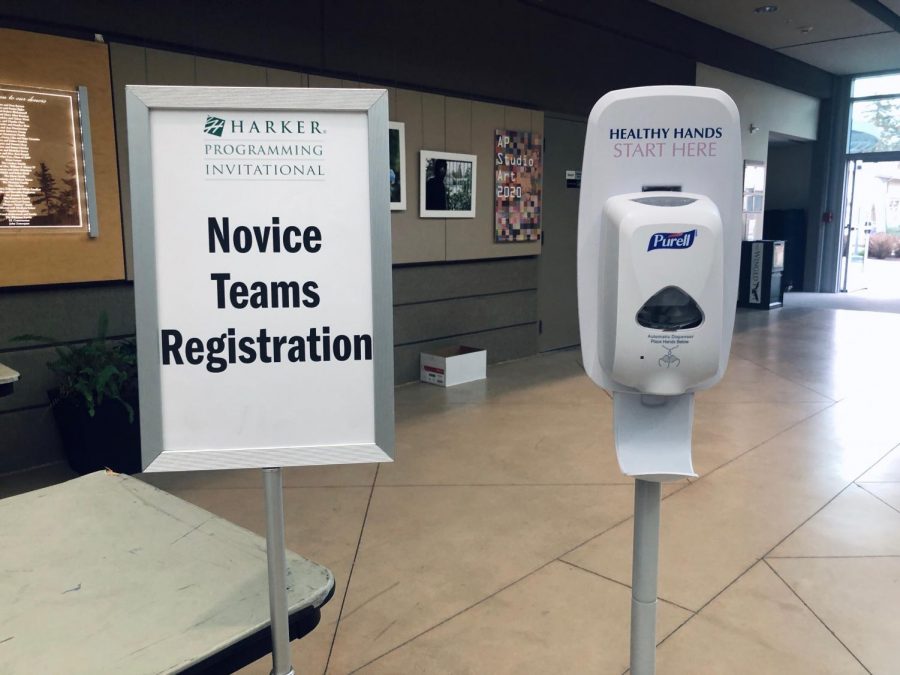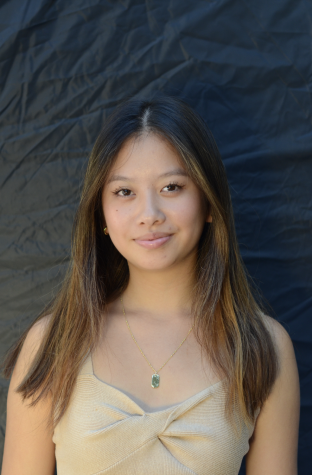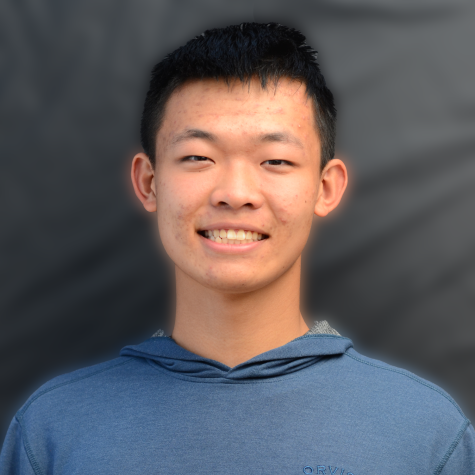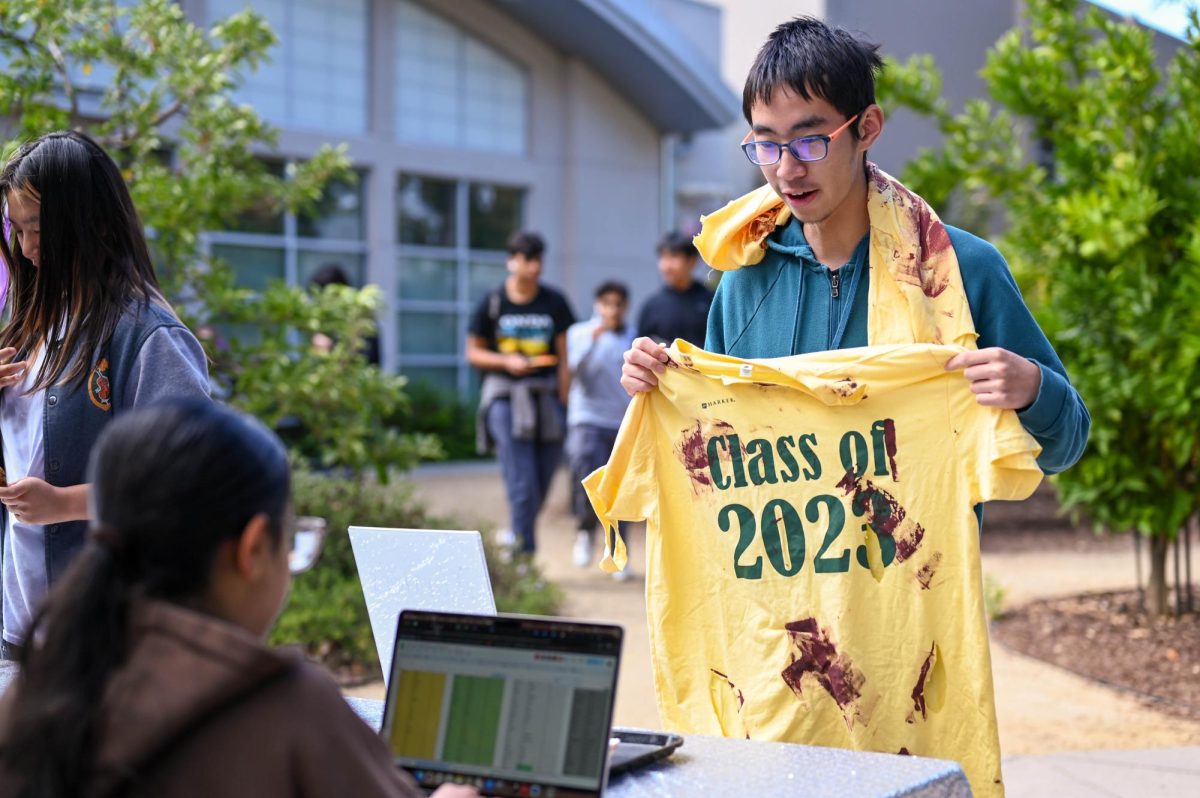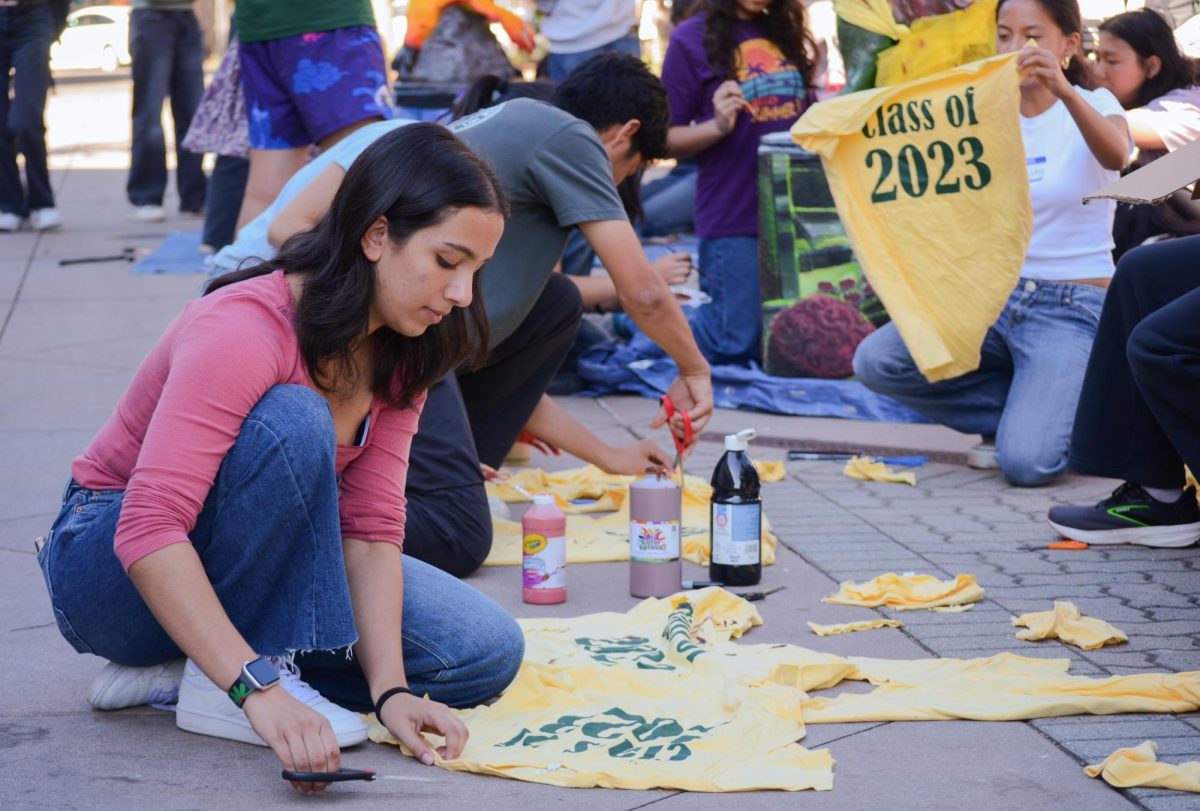Upper school hosts annual Harker Programming Invitational with extra precautions due to coronavirus concerns
A hand sanitizer station stands at the registration table for the Harker Programming Invitational. Extra hygienic precautions were taken this year due to concerns over the coronavirus.
March 8, 2020
Three students huddle around a table in the Nichols atrium, speaking in hushed voices together as their eyes focus on the problem set in front of them. One picks up a pencil and begins drawing out a list of numbers on the page, attempting to explain a potential solution to his teammates.
After the others listen to his logic, ideas start pouring forth, and within minutes, they are typing out the final line of their code on the laptop in front of them and are ready to test their work. The air is tense and full of suspense as they watch the server run, but this anticipation is quickly replaced with relief and joy as a bright green check mark appears on the screen.
One problem done, eleven more left to do.
The Harker Programming Club (HPC) hosted its eleventh annual Harker Programming Invitational (HPI) in Nichols Hall on Saturday, with the theme this year being cybersecurity in computer science.
115 middle and high school students from schools all around the Bay Area participated in a two-hour long coding contest in the morning, forming teams of up to three members to solve a variety of algorithmic problems. There were two different levels, novice and advanced, which separated contestants based on their past experience in computer science and programming.
“The problems were challenging, but it was a fun bonding experience that we were able to learn a lot from,” said Ashley Hu (9), who participated in the advanced category.
After the contest, participants listened to a keynote speech about artificial intelligence from Jagdeep Singh, co-founder and CEO of the QuantumScape Corporation, a startup working in energy storage.
Following Singh, panelists Riana Pfefferkorn, Associate Director of Cybersecurity and Surveillance at Stanford; Hitesh Sheth, CEO of Vectra; Victor Fang, CEO Anchain.ai; and Manoj Apte, CSO of Zscaler, discussed cybersecurity-related topics and questions proposed by the students.
HPC has been organizing HPI since last fall. They invited speakers to present, contacted possible sponsors for funding and designed t-shirts and fliers. The 17 problems were written by club officers, who also proctored the contest. Susan King, upper school computer science teacher and HPC mentor, supervised the entire event and its coordination.
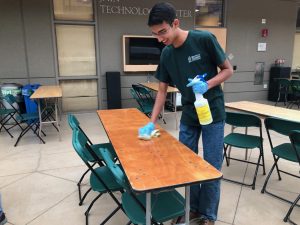
Arnav Joshi (12) uses disinfectant to clean a table to prepare for the arrival of contestants.
Along the way, the student organizers faced many difficulties that they had to address and resolve, with the main one being the spread of the novel COVID-19 in the Bay Area. This year, extra precautions were taken to increase participants’ safety and to minimize any potential exposure to the virus at the event.
“First, Ms. King did a lot of coordination with Nurse Nott to go over what our relationship was with the larger school’s administration,” HPC co-president Bryan Wang (12) said. “We got the go to continue with the Harker Programming Invitational, and after that was done, we brainstormed what we had to do.”
Even before the contest began, club members disinfected all the tables in the atrium with alcohol. At the end of the day, the tables and chairs were cleaned again. Two automatic hand sanitizer stations were placed at the registration desk, and contestants were instructed to use them before entering the classrooms. During lunch, contestants sanitized once again while waiting to receive food.
HPC also implemented a “quarantine system” when all participants were in the auditorium together to minimize unnecessary contact.
“The Nichols auditorium can be really packed, so we sat one team to each row on the left and right sides, allowing extra seat spaces,” Bryan said. “By doing this, we isolated teams to their own members, which reduced any unnecessary interaction.”


















![“[Building nerf blasters] became this outlet of creativity for me that hasn't been matched by anything else. The process [of] making a build complete to your desire is such a painstakingly difficult process, but I've had to learn from [the skills needed from] soldering to proper painting. There's so many different options for everything, if you think about it, it exists. The best part is [that] if it doesn't exist, you can build it yourself," Ishaan Parate said.](https://harkeraquila.com/wp-content/uploads/2022/08/DSC_8149-900x604.jpg)




![“When I came into high school, I was ready to be a follower. But DECA was a game changer for me. It helped me overcome my fear of public speaking, and it's played such a major role in who I've become today. To be able to successfully lead a chapter of 150 students, an officer team and be one of the upperclassmen I once really admired is something I'm [really] proud of,” Anvitha Tummala ('21) said.](https://harkeraquila.com/wp-content/uploads/2021/07/Screen-Shot-2021-07-25-at-9.50.05-AM-900x594.png)







![“I think getting up in the morning and having a sense of purpose [is exciting]. I think without a certain amount of drive, life is kind of obsolete and mundane, and I think having that every single day is what makes each day unique and kind of makes life exciting,” Neymika Jain (12) said.](https://harkeraquila.com/wp-content/uploads/2017/06/Screen-Shot-2017-06-03-at-4.54.16-PM.png)








![“My slogan is ‘slow feet, don’t eat, and I’m hungry.’ You need to run fast to get where you are–you aren't going to get those championships if you aren't fast,” Angel Cervantes (12) said. “I want to do well in school on my tests and in track and win championships for my team. I live by that, [and] I can do that anywhere: in the classroom or on the field.”](https://harkeraquila.com/wp-content/uploads/2018/06/DSC5146-900x601.jpg)
![“[Volleyball has] taught me how to fall correctly, and another thing it taught is that you don’t have to be the best at something to be good at it. If you just hit the ball in a smart way, then it still scores points and you’re good at it. You could be a background player and still make a much bigger impact on the team than you would think,” Anya Gert (’20) said.](https://harkeraquila.com/wp-content/uploads/2020/06/AnnaGert_JinTuan_HoHPhotoEdited-600x900.jpeg)

![“I'm not nearly there yet, but [my confidence has] definitely been getting better since I was pretty shy and timid coming into Harker my freshman year. I know that there's a lot of people that are really confident in what they do, and I really admire them. Everyone's so driven and that has really pushed me to kind of try to find my own place in high school and be more confident,” Alyssa Huang (’20) said.](https://harkeraquila.com/wp-content/uploads/2020/06/AlyssaHuang_EmilyChen_HoHPhoto-900x749.jpeg)



